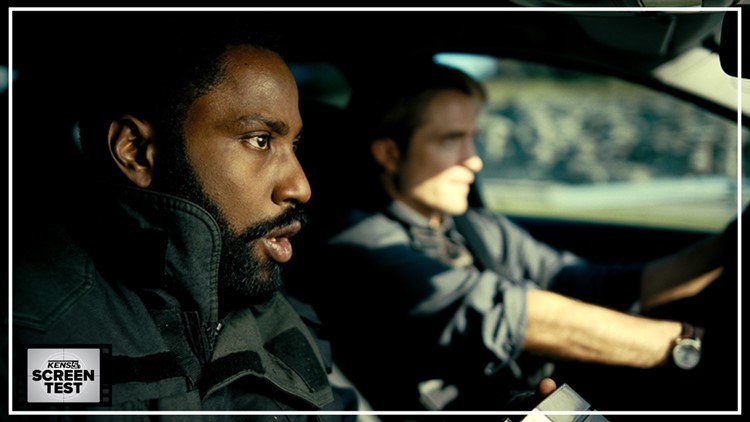For 20 years, buying a ticket to a Christopher Nolan movie has meant taking the director up on a bet that we’ll keep up with the scope of a grand vision, to expand our imaginations at the same mind-melting rate as he has expanded the potential of IMAX screens and narrative potential. We gladly call him on the gamble. We may even push all our chips in, if only because that’ll make the ecstasy of exceeded expectations even sweeter in an age when most other major event movies of the IP-mining era tend to prioritize narrative peace of mind over the notion that moviegoers want to be challenged as much as they want to be satisfied.
With Nolan’s 11th feature, the long-anticipated and pandemic-delayed “Tenet,” the filmmaker isn’t daring us to keep up so much as he’s daring us to care. An obsessive tactician who has detonated derelict hospitals and resurrected World War II-era aircraft in the name of blowing our minds (and box office charts), Nolan’s biggest stunt with “Tenet” is his screenplay. To be sure, Big Things Go Boom, including, but not limited to, a titanic airliner, an opera house and an abandoned desert city. But after cementing his legacy with origami streets and characters navigating time-diluted dilemma after time-diluted dilemma, he’s decided to test us with his most practically complex and emotionally arbitrary work to date. Aesthetically, “Tenet” is Nolan at his most maximalist. But maximalism isn’t the same thing as exceptionalism.
Nolan’s trademarks are on full display from the opening scene, because his opening scene is practically a Nolan trademark in itself (woah). Gun-toting adversaries face off amid a large-scale hostage situation in Russia to the tune of another pulse-quickening Hans Zim...er, Ludwig Göransson score—a major set piece that sets the blockbuster mood, with some confusing turns to boot. That’s to be expected. Because this is Nolan, we expect to be straightened out later. For now, we’ll grin, munch on our popcorn and worry for our eardrums.
And worry about our protagonist, as well. John David Washington leads the way in “Tenet,” although he’s not off to a great start; an American spy who seems to have planted himself in Russia in order to get to a contact, he’s been made. After a gruesome torture session, he might be doomed, too. Until...well, that’s when Nolan starts to get Nolan-y, embarking on a plot that’s very liberal with its MacGuffins, motivations and locations, and very conservative in any attempt at making us believe he cares about any of that as much as he cares about the clockwork of his soft-sci-fi mechanics. He’s constructed a thriller that’s easy to market but difficult to be consumed by, despite our desperate willingness for “Tenet” to snap us up.
There’s talk of nuclear threat and the production design is as sleek as we’ve come to expect of the director, but his familiar lightning-quick pacing threatens to be a detriment. The gunplay is chaotic, Washington is charismatic as all-hell and there’s a particularly inspired car chase around the movie’s midsection, though all these are also checks in the pro column because they distract from the movie’s lethal con: Endless streams of exposition about the movie’s ostensible drawing card – the admittedly attractive-sounding concept of “time inversion” – that are so verbose that one suspects the director is making up for the scarcity of dialogue in “Dunkirk.”
Nolan loves exposition, of course—it practically makes up the entire first act of “Inception,” considered by many to be his masterpiece. It’s as vital to his non-Batman films as masks are to 2020. Here, though, it’s all too easy to look past the backwards-flying bullets and temporal paradoxes to see the director is trying to have his galaxy brain cake and eat it too. Watch any “Tenet” trailer and you’ll spot a character wearing a white lab coat and a soft smile, encouraging Washington’s character (credited simply as “Protagonist”) that it’s no use trying to understand the practicality of time inversion. “Just feel it,” she tells him, Nolan speaking to the audience via a cheeky bit of self-awareness (and less annoying than when a clock is manually turned back by a foe). She may as well be cautioning us to keep our arms and legs inside the vehicle at all times.
But this ride’s underlying machinery is inseparable from the plot, and “Tenet” – despite its own suggestion – clearly needs us to understand how it all works. Over the course of their mission, the Protagonist, along with his partner Neil (Robert Pattinson, back in blockbuster mode), discover new quirks in this time-loop logic that must be considered, though that’s largely expressed by looks of confusion on their faces rather than the words they’re saying. In what’s become a puzzling trend as of late for Nolan, my experience watching “Tenet” in a theater was marred by a struggle to decipher what characters were saying in pivotal scenes when visual bombast gives way to explanation. (Social media accounts from other critics confirm this wasn’t an issue with the theater but very much the intention.) It robs this action-espionage-drama of narrative momentum. Twists were more likely to get a “Huh?” from me than an “Ah-hah!” While my eyes widened with awe at a few stunning moments of pure viscerality, they were squinting in strained frustration far more often. For a movie that insists understanding is inessential, understanding feels integral to getting a satisfying payoff. Why is a third-act debriefing scene so incomprehensible and yet so packed with implication?


The irony of it all is that while this is Nolan’s biggest extravaganza of a screenplay – his 103-yard Hail Mary, his 56-game hitting streak – it might be his most feeble story. For as solid a performance as Washington submits here, the Protagonist is defined by little more than a robotic urge to “save the world.” It’s deeply underwhelming, especially at a time when some of our biggest action stars – Ethan Hunt and Mad Max and James Bond among them – have seen their psychological profiles deepened in recent installments. Meanwhile, Elizabeth Debicki, whose presence begs for the big screen, is relegated to a largely passive role in which Nolan is all too eager to have her strings pulled and her life threatened by Kenneth Branagh’s comically laughable Russian supervillain (who brings with him more exposition). It’s difficult to be intrigued by his Andrei Sator holding a knife to the world’s neck when his dialogue is hijacked from a blockbuster with much grander scope and much simpler emotional appeal. (Not only is “Anger scars over into despair” an actual line here; it’s referenced again at what should be a high point of the nonexistent drama.) Andrei would surely twirl his moustache if he had one.
It’s all the stranger when you reflect “Tenet” against Nolan’s filmography. The writer-director’s most exciting efforts tightly bind character with the scope of his vision. Their journeys become ours. We may not have understood how Cobb hops from dream to dream in “Inception,” but we empathized with the desperation of wanting to reunite with his kids. We may neglect to understand the constriction of time on the water-covered planet of “Interstellar,” but there’s no ignoring how Cooper breaks down upon seeing how old his daughter has grown after they’re briefly stranded. “Dunkirk” feels like Nolan at his most narratively elemental because character and spectacle are practically one in the same.
Aside from a de-centralized subplot about a mother and her son, similar stakes are absent in “Tenet,” a movie in which consequences don’t seem to be as important to Nolan as logistics. The imbalance of pathos and ethos is never less than distracting; in trying to spot a place to anchor our emotional investment, we find only concrete (and more exposition). It’s worth wondering, ultimately, why the Protagonist is so bent on saving humanity when so little humanity is on display.
The quandary here is that Nolan presumably spent some years puzzling over his screenplay, making the pieces fit as well as they could, while spending a comparatively miniscule amount of time drawing characters that barely transcend the purpose of audience proxy. The plot is a fine-tuned enigma surrounded by impenetrable lack of emotion (thank god for those quips). But Nolan must know two and a half hours isn’t enough to locksmith our way inside. I wondered if this may be the first movie I would legitimately suggest most audiences would enjoy more if they dived deep into spoilers beforehand, except that there’s extremely little that’s left to be admired. Nolan feels like the only victor here, by virtue of having solved a Rubik’s Cube with a million sides. When the credits rolled, I wasn’t gripped by the same satisfaction I remember having the first time I saw a spinning top or motorcycle-riding avenger cutting to black. And I’m not particularly keen on the idea that that satisfaction is meant to be found once I take the time to read through a Reddit thread.
"Tenet" is rated PG-13 for intense sequences of violence and action, some suggestive references and brief strong lanuage. It opens Friday at indoor theaters and some drive-in cinemas.
Starring: John David Washington, Robert Pattinson, Elizabeth Debicki, Aaron Taylor-Johnson, Kenneth Branagh
Directed by Christopher Nolan
2020
OTHER SCREEN TEST REVIEWS:
- ‘I’m Thinking of Ending Things’ Review: Charlie Kaufman resumes his search for meaning in haunting Netflix head trip
- ‘Epicentro’ Review: A monumental and monumentally complex observation of Cuba at a crossroads
- ‘Centigrade’ Review: Wintry thriller feels as weary as its trapped victims
- ‘Tesla’ Review: Overlooked innovator gets the spotlight in alluringly unconventional biopic
- ‘Unhinged’ Review: Russell Crowe is on a rampage in brutal, thematically stagnant thriller
- L‘Boys State’ Review: Political maneuvering knows no (age) limits in enthralling new documentary
- ‘Sputnik’ Review: Spunky and smart creature feature makes for a tantalizing feature debut
- 'Canción Sin Nombre' Review: Haunting drama zeroes in on the no man's land of political revolution
- ‘She Dies Tomorrow’ Review: An unnerving study of primal reckoning
- 'Radioactive' Review: An actively frustrating biopic



